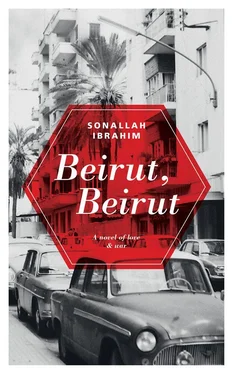I washed my hands and face and slung the bag over my shoulder, heading out of the room to go downstairs. I left the key at reception, then went outside. All of a sudden, one of the young men stopped me, calling out, “Where are you headed, sir?”
I looked up at him inquisitively, and he added, “Are you crazy? The streets are dangerous now.”
I hesitated and looked around me. I noticed a payphone in a corner and headed towards it, as I pulled my notebook out of my pocket.
I met Wadia Masiha when I entered high school. We studied in the same class, but he sat far away from me. We all wore shorts, except for two or three of the oldest boys, and we got a hidden pleasure from our bare knees rubbing together. In some classes, we would change places for this purpose, and everyone would sit beside someone he took a liking to. In this contest, I would strive to sit next to Wadia. He had long legs, with thick calves and smooth knees.
We didn’t visit each other’s homes often. My mother didn’t like him coming over, and his house stirred up feelings of aversion and terror in me. In broad daylight, it was dark, and stuffed with old furniture. Sounds didn’t echo back there, and a distinctive smell wafted within it — a mixture of frying oil and decay resulting from the damp walls.
Once I told him he was a “ blue bone ” without understanding what that expression meant. Instantly, his face grew pale and he became angry, then he stopped being friends with me. Two weeks later, I happened to meet him after we were let out from school. Several of the biggest boys in our class surrounded him and made him repeat “ blue bone ”. The look in his eyes terrified me. It spoke of a fear I had never seen before.
We renewed our friendship at the university, which we entered together some months after the outbreak of the Egyptian revolution. We found ourselves among a group of ardent youth: we would read Sartre, Gorky and Lefebvre; we would attack Taha Hussein in defense of socialist realism, and attack the government of “military men” in defense of democracy. We would cross the streets of Cairo on foot, in our shoes with holes in them. Then we were all arrested when Gamal Abdel Nasser tightened his iron fist in March 1954. After that, we went to prison together, during the climax of Nasser’s battle with the left.
But Wadia left prison after only one week, while I stayed there until the general pardon was proclaimed in 1964. After a while, I found a job at a newspaper. I found him working there. He had become prominent in the government’s political organization, the Arab Socialist Union, of which everyone was trying to become a member. So it was no surprise that our ideas and opinions were in accord. We both felt the same shock when the Israeli aggression in 1967 resulted in our defeat.
The next year, he was appointed to the newspaper’s office in Beirut. At that time, traveling abroad was our collective dream: it was easier to pass through the proverbial eye of a needle. I wasn’t able to do it until I had resigned from the newspaper and sought the help of several personal connections. I went to Beirut, where Wadia hosted me for several weeks. Then I left Lebanon, and didn’t see him for many years. But I knew that he had gotten married to a female relative of his, and had become the director of the newspaper’s bureau in the Lebanese capital. That didn’t surprise me, since he was capable in his work and had the most solid relationships with key people from all the different parties and factions and maintained meticulous records of every piece of information.
The newspaper transferred him to its main headquarters in Cairo after the war in October 1973. But he kept trying until he got back his posting in Beirut in mid-1976. When he was recalled to Cairo after a year, he refused to return and resigned. Then he joined a newspaper funded by the Iraqis, and finally moved from there to a private press agency run by an enterprising Lebanese journalist named Nazar Baalbaki.
I didn’t find it hard to get his home telephone number from the agency’s headquarters. I waited for him in the hotel lobby until he arrived fifteen minutes later. We embraced each other warmly, each studying the changes time had wrought on the other. He commented on the color of my hair, while I found fault with the weight he had put on and the prescription glasses that covered half of his face. Then he led me outside, ignoring my talk about the warnings I had been given about dangers in the street, saying: “I’ve got different identity cards for different situations. And we won’t be going far.”
We entered an empty bar on a nearby street. “Will you be staying long?” he asked me as we sat down.
“Several days,” I replied. “I don’t have a lot of money.”
“Are you going to publish something?”
“Yes. I have a book being published with Adnan Sabbagh.”
“But he isn’t in Beirut now, I think.”
I looked nervously at him, and said, “But we made an appointment to meet here on Monday. Do you think the recent events could have canceled this meeting?”
“What happened is a normal occurrence — it happens every other day. The Lebanese have gotten used to that, and life now moves along naturally, no matter what. In fact, there is a helicopter company that transports people across districts that are fighting each other so their work won’t get interrupted.’
The waiter brought us two glasses of whiskey. I looked around me and found that we were still the only patrons under the dim lights. The bartender was in the midst of a whispered conversation with two of his colleagues, and they looked over at the door from time to time.
Suddenly the staccato sound of bullets reached us from outside. The whispered conversation at the bar stopped. We all listened in fear. Several minutes passed, but the sound wasn’t repeated, and hesitantly the whispering began again.
“Where are you working now?” Wadia asked me.
“Nowhere,” I replied.
“So how do you make your living?”
“From writing.”
“Is that possible?”
“Maybe. If you keep your needs within tight limits. And my wife was working.”
“I heard that the two of you split up.”
“Yes. We went different ways, in spite of ourselves.”
“You should have done like I did. My wife and I only see each other in the summer. She spends the rest of the year with the children in Cairo.”
“I don’t understand why you insist on not going back to Cairo.”
He tapped the ashes from his cigarette in the ashtray, and with the tip of it began drawing imaginary circles in the air, then said: “Whenever I pictured myself there, I felt like I was suffocating.”
We were both lost in thought, and then he asked me, “Who are you meeting?”
“Just a few people,” I replied. “I don’t get around much anymore.”
A crooked smile spread over his lips. “So you’ve quit your old friends?” he said.
“You know what keeping in contact is like now. Traveling to Beirut is easier than moving between neighborhoods in Cairo.”
“And how are things generally? The situation as a whole?”
“Normalization with Israel is moving ahead. Prices are increasing and services are declining, too. Plundering is a growth industry, and the number of millionaires has grown to several hundred.”
He looked me carefully in the eye, then asked, “Are you planning on meeting someone in particular? There are a lot of fugitive Egyptians here.”
“I’ve come for one purpose only, and as soon as I’m done with it, I’ll go back.”
“Tell me about your book.”
I made a vague gesture with my hand. “It’s essentially a trip around the Arab world in a way that resembles the venerable maqama genre of rhymed prose. The hero turns up in every country, then he is kicked out, only to appear in another one, and so on.”
Читать дальше












